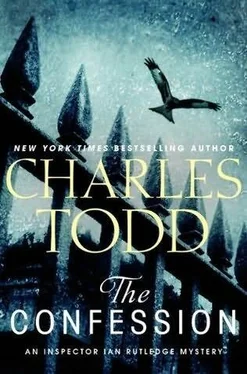Charles Todd - The Confession
Здесь есть возможность читать онлайн «Charles Todd - The Confession» весь текст электронной книги совершенно бесплатно (целиком полную версию без сокращений). В некоторых случаях можно слушать аудио, скачать через торрент в формате fb2 и присутствует краткое содержание. Жанр: Полицейский детектив, на английском языке. Описание произведения, (предисловие) а так же отзывы посетителей доступны на портале библиотеки ЛибКат.
- Название:The Confession
- Автор:
- Жанр:
- Год:неизвестен
- ISBN:нет данных
- Рейтинг книги:5 / 5. Голосов: 1
-
Избранное:Добавить в избранное
- Отзывы:
-
Ваша оценка:
- 100
- 1
- 2
- 3
- 4
- 5
The Confession: краткое содержание, описание и аннотация
Предлагаем к чтению аннотацию, описание, краткое содержание или предисловие (зависит от того, что написал сам автор книги «The Confession»). Если вы не нашли необходимую информацию о книге — напишите в комментариях, мы постараемся отыскать её.
The Confession — читать онлайн бесплатно полную книгу (весь текст) целиком
Ниже представлен текст книги, разбитый по страницам. Система сохранения места последней прочитанной страницы, позволяет с удобством читать онлайн бесплатно книгу «The Confession», без необходимости каждый раз заново искать на чём Вы остановились. Поставьте закладку, и сможете в любой момент перейти на страницу, на которой закончили чтение.
Интервал:
Закладка:
They carried the boxes out to the nearest overhead bulb and set them down. Pulling forward a stool and a chair, Thompson took out his pocketknife and carefully cut the string.
“There you are, sir,” he said again.
Rutledge sat in the chair and took out the first layer of items, mostly shoes and clothing that Willet had worn in the course of his duties in the house. Below that were several newspapers, now yellow with age, reporting events leading up to Britain’s declaration of war against Germany. There were even half a dozen broadsheets setting out where men could go to enlist.
Replacing the newspapers and then the clothing under Thompson’s watchful eye, he set the first box aside and opened the next one. This seemed to include items that were in Willet’s room here in the Laughton household, and more clothing, of the sort he might wear on his half day off. There was a photograph of a fishing boat, presumably his father’s, framed in tarnished silver plate, and a cutting from a
newspaper, also framed, showing a woman standing in front of a display of flowers. The caption beneath it read: MISS CYNTHIA FARRADAY, AND THE PRIZEWINNING ORCHIDS AT THE LONDON FLOWER SHOW.
The date on the newspaper, just visible at the edge of the frame, was April 1914.
She was as young as the face in the locket, smiling for the camera while one hand lifted a spray of orchids so that the photographer could capture it better.
Hamish said, “He knew her. Knew who she was.”
Silently agreeing, Rutledge replaced the contents as carefully as he’d lifted them out, and reached for the third box.
Inside it were several books-one was a volume of poetry, the other a one-volume collection of Shakespeare’s plays, and the last was a novel by an American writer, Henry James. Beneath these were a stack of copybooks, the sort that children used to practice their penmanship.
“I don’t know that you should look at those,” Thompson said as Rutledge took one and prepared to open it. “They may be private papers.”
But Rutledge had no choice. It was difficult to decipher the handwriting-it was close together and cramped, the better to fit more lines to the page. He thought at first that this was a sort of diary, and then he realized it was not. The heading on the first page he came to was CHAPTER SEVENTEEN, and there followed a paragraph describing a village in France.
It was, in fact, more fanciful than accurate, although the writing was very good. The next paragraph picked up a thread from what was presumably the preceding chapter, for a woman was looking for a particular house. She found it on a side street and stood for a moment in the rain, trying to decide whether to knock at the door or walk on.
Her internal monologue as she debated what to do was extraordinarily good.
Rutledge looked up from his reading. “Did you know about these? Did anyone?”
“Willet had a room to himself-there was only the one footman, you see-and he spent a good deal of his free time there. Especially in the evenings, when the family wasn’t entertaining or had gone out to dine. One of the housemaids accused him of being too good to associate with the rest of the staff in the servants’ hall, but he told her that he liked to read, and this was his only opportunity.”
Rutledge took out another of the copybooks and read a few pages. It was not as good as the work in the first one. Apparently Ben Willet was trying to write a novel, for there were only seventy-five pages here, and the writing broke off with a splatter of ink, as if he had been disgusted and thrown the pen down.
He had begun again in another copybook, and that one also stopped abruptly. His third attempt showed promise, and by the fourth he lacked the experience to tell the tale he had in mind-witness the incorrect description of a French village that was vaguely reminiscent of Essex-but his characters showed depth and maturity.
Thompson was growing restless, clearly eager to go back to his interrupted dinner. Reluctantly Rutledge put the copybooks back in the order in which he’d removed them, and said, “This will do for now. Thank you.”
Thompson helped him carry the boxes back to where they’d found them, and the two men left the attic, turning out the light as they reached the stairs.
“Was it a diary, sir?” Thompson asked, clearly worried about what his former footman had seen fit to write about the family and the staff.
“Not precisely,” Rutledge replied. “I should leave the copybooks where they are. They will do no harm.”
“Thank you, sir.” They had reached the kitchen, and Thompson said, “I still have duties requiring my attention. Mary will see you out.”
And the same housemaid who had opened the door to him earlier led him back up the stairs, through the servants’ door into the hall. She said, as he stepped out into the warm night, “Was it really Ben Willet you came here about?”
“Why do you ask?”
“I saw him in May, the twenty-ninth, it was, when we were in the London house. He didn’t see me. I was on an omnibus and he was walking along the street. He looked-ill. I never said anything. It wasn’t my place. But I wondered. Was it a war wound, do you think? Or was he drinking himself into oblivion? They’d never take him back here, if that’s what it was.”
“He was suffering from an illness,” he told her.
“Was? Is he better? Dead?” When he didn’t answer, she added, “Then he won’t be coming back.”
“I’m sorry.” He meant it.
“We all thought he’d be back, after the war. His things were here, you see. A promise, you might call it. We liked him. He could be very funny, you know. Really, he should have gone on the stage. He was such a gifted mimic.” She bit her lip. “I didn’t want to believe it, you know. But someone told me-someone he’d known before the war-that he wanted to live in Paris. That he liked France. But he didn’t after all, did he? I saw him last May in London. Myself.”
“Who told you this?”
“William Neville. He was a footman in the house next but one to ours in London. He met Ben Willet in hospital in the last weeks of the war. They had trench foot, of all things. He said Ben talked about nothing but France, how different it was from what he expected. He said if he had the money to do it, he’d stay there after the war was finished. William told him he was a fool. And Ben said, all right, he’d come back to London and work five years. Then he’d go back to France and find out if he still wanted to live there. William told him that was brilliant. Ben laughed and said, no, it was economic necessity.”
“Did you like him?”
“Not so much a liking,” she said, considering her feelings. “But he was nice, if you know what I mean. Never any trouble, never any worry. Sometimes on our afternoons off, we’d go into Thetford. It was great fun. Like having a beau for a few hours, then back to ourselves again when we got home.”
He could understand that. Service had strict rules. No romances, no marriages, no unbecoming conduct. All the same, the servants were human, and two young people would find in pretense an escape from the tedium of everyday life.
“Thompson told me that he’d spent a good deal of his time in his room.”
She looked over her shoulder, then said, “He liked to take books from Mr. Laughton’s library. He wasn’t supposed to, but he always brought them back. And so I never told anyone. He was very careful with them.”
“What sort of books?”
“I have no idea. I do know he borrowed a Bible once. I said to him, ‘Don’t you have a Testament of your own?’ And he said he’d never had one. I thought that was very strange.”
There were voices in one of the passages behind her. She said hastily, “I must go.” She shut the door firmly and left him there on the steps.
Читать дальшеИнтервал:
Закладка:
Похожие книги на «The Confession»
Представляем Вашему вниманию похожие книги на «The Confession» списком для выбора. Мы отобрали схожую по названию и смыслу литературу в надежде предоставить читателям больше вариантов отыскать новые, интересные, ещё непрочитанные произведения.
Обсуждение, отзывы о книге «The Confession» и просто собственные мнения читателей. Оставьте ваши комментарии, напишите, что Вы думаете о произведении, его смысле или главных героях. Укажите что конкретно понравилось, а что нет, и почему Вы так считаете.












